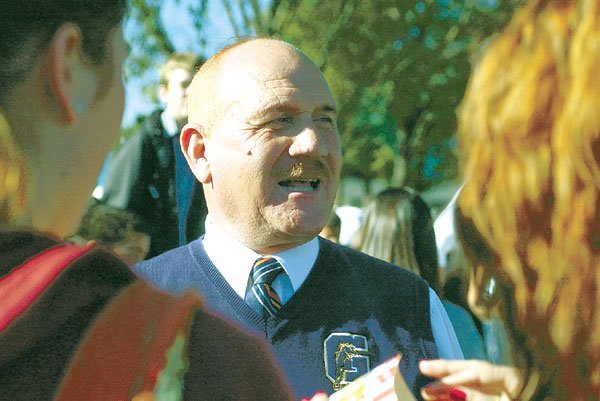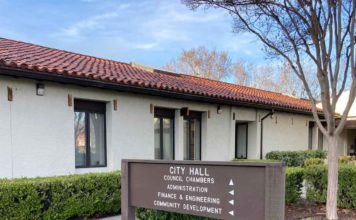Over a period of three council terms, Charles Morales has helped
clean up Gilroy’s streets
Gilroy – Ten years ago, Charles Morales gave his fellow council members a tour of Rogers Lane after a series of drive-by shootings.
He recalls venturing into a backroom of a home where elderly people lived. Mattresses were spread out on the floor and the walls were pock-marked by bullets.
“They were afraid of raising the beds because they might get shot,” Morales said. “To me, that was the turning point.”
Since ascending to city council in 1992 as the public safety candidate, the former Santa Clara County probation officer has focused on placing gang violence at the top of the city’s agenda. Over the course of three council terms, Morales has helped clean up the city’s streets by working with local families and youths and by helping to forge a collaboration of local and county law enforcement agencies. As Morales heads into his final week on council after losing a November re-election bid, he speaks of his 37 years in the probation department as the source of his triumphs and defeats.
“If I had to say, that would be my legacy,” Morales said of his efforts to reduce gang culture.
Morales, 59, has spent his entire life in Gilroy, much of it working at the William F. James Boys Ranch. He can explain the intricacies of gang recruitment, map out gang turf from memory and rattle off the tattoos and graffiti associated with gang sub-groups.
He said he used his knowledge and connections to help bring together local police, county sheriffs and the probation department into “one of the most powerful collaborations in the area.”
In the wake of a series of drive-by shootings in the mid-’90s, those law enforcement agencies conducted a major sting on area businesses where crime flourished. But police were not the only ones fighting gangs and crime.
“After the sting, we started closing many of the places where gang elements gathered,” said Morales, who joined the council in pushing through laws to shutter card rooms and other businesses.
In 1996, following the first homicide at Gilroy High School, Morales formed the Concerned Citizens for Public Safety, a group in which he remains involved. He also spends time at GHS talking to youths in hopes of steering them away from gangs.
For his efforts, Morales’ former home on Sixth Street and his car were vandalized. That was not the only price he paid for his years of service. Looking back, he wondered if he should have spent 37 years in the probation department instead of retiring after 20 years.
“The job put me under a lot of stress that led to my problems with alcohol,” said Morales, who was arrested on a third drunk driving charge in 2003. Morales clung to his council position following the incident despite a sea of furious critics, including The Dispatch editorial board, who called for his resignation.
In the latest campaign, he was forced to answer for the arrest once again.
“The scar on my head is not the only scar I have from my job,” he told the Dispatch, saying that he had faced his problem and put it behind him.
Despite his personal demons, Morales’ friendly and approachable personality and his close work with youths continues to win admirers in the community. But on the dais, some have questioned Morales’ independence as a policymaker.
“Charlie would flip and flop more often than any person on council that I could recall,” said Mark Zappa, a Republican campaign organizer and anti-tax crusader. “His defenders would say that he’s not an ideologue and he’s open to other ideas. I disagree with that. I think Charlie was too influenced by the people close to him.”
Zappa pointed as an example to a spring council vote to endorse a $5 countywide vehicle license tax. Just days after helping defeat the measure 4-3, Morales called for a second vote and switched his position. The move came after he received a call from long-time friend and Santa Clara County Supervisor Don Gage, who was lobbying city councils throughout the county for their seal of approval.
Gage, a former Gilroy mayor who served on council with Morales in the mid-’90s, defended his friend’s decision.
“I think that every politician has a right to change his mind,” Gage said. “You get bent in every direction. …You have to try to get all the facts and make your decisions. There’s nothing wrong with changing your mind as long as you express why to the public.”
Morales said that “every case has to be judged by its own merit and every decision that’s made on the dais is not a single-agenda decision. You have to weigh the pros and the cons.”
In his last month on the dais, Morales has defied critics by championing two controversial ordinances. One would ban fireworks in the city and the other would restrict the possession of pit bulls – a notorious part of gang culture.
Morales, who will step down from council Dec. 19, said he has no plans for another council bid, but he does intend to remain involved in the high school parent’s club and youth. Morales has three daughters and seven grandchildren, four of whom now attend GHS.
“I would like the new council to be proactive in the neighborhoods and schools,” Morales said. “I would be very concerned if the focus on gangs falls by the wayside. The council needs to learn who’s getting recruited and who’s getting victimized.”














